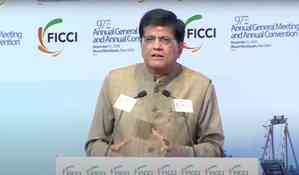Business Communication as a Career
What is Business CRajeev Gupta, Director- Admissions, Sharda University. ommunication?

Business communications covers a wide range of topics related to the promotion of goods, services, and organisations. Careers in management are possible in this profession, and they come with good incomes and promising work prospects. For people who are interested in working with interpersonal communications between any organisation and the public, business communications can be a very open professional path. Business communication specialists work for non-profit organisations, public institutions, or for-profit corporations.
Topics covered by business communication include marketing, brand management, consumer behaviour, customer relations, advertising, public relations, corporate communication, community involvement, reputation management, interpersonal communication, employee engagement, and event management
Why is Business Communication a good career option?
A career in corporate communication will help you learn how to deal with consumers and buyers, solve real-world business challenges, and build effective communication and interpersonal skills. The reasons why a career in Business Communication is good are given below.
• Gaining proficiency in business communication can accelerate one's career in the media, news, design, television, and other fields.
• In the field of communication, there are so many interesting work prospects.
• The candidate's ingenuity and ideas will be valued.
• The core of every modern business is technology. The business communications sector always adopts new technologies first. One will be equipped to use cutting-edge technology
Types of Business Communication
Internal Business Communication: Internal business communication is defined as communication that takes place between members of an organisation. Both formal and informal forms of communication are covered. Internal communication is every time different departments share information with the company's personnel. Effective internal communication is essential since it boosts output and levels of satisfaction.
External Business Communication: External business communication refers to any exchange of information about a business firm with representatives of other businesses or other organisations outside of the business environment. Organizations frequently collaborate with one another to expand their commercial potential. Unlike other forms of company communication, external communications are often conducted by written or vocal means.
Formal and informal are the two categories of external business communication. The formal external business communication uses media like memos, reports, presentations, and letters, while the informal external business communication uses a variety of media and is typically uncontrolled by an organisation.
What are the duties of those who work in business communication?
Business communication specialists' daily tasks depend on their skill sets. Planning campaigns and promotions to improve someone's public image is the responsibility of a public relations specialist. They could be employed by a company to assist in the production of advertisements or commercials that market a good or service. Technical writers produce instruction manuals, books, and other writings that take complex information and make it understandable.
Business Communication Professional Job Profiles:
1-Marketing Associate: In order to generate promotions for an organization's goods and services, this job role collaborates with advertising, PR, and marketing managers. They research the market and look to expand by entering new markets. In order to create price strategies that would boost earnings, marketing employees are also in charge of gathering data.
2-Communication Assistants: The application of communications tactics is the responsibility of communications assistants. They develop efficient channels of communication for internal and external uses while collaborating with communication managers and other departments with the aim of presenting the organization in a favorable light.
3-Public Relation Specialist: You can work as a PR specialist for businesses, institutions, government agencies, or for yourself. The position entails preparing press releases, responding to unfavourable coverage, and interacting with a variety of interest groups, including the media, shareholders, employees, and customers. Governmental relations, public affairs, and crisis management may occasionally fall under the purview of PR experts.
4-Technical Writers: Technical writing refers to writing about a particular topic in a format that calls for direction, explanation, or instruction. Pamphlets, catalogue descriptions, advertising, and instruction manuals are just a few of the written materials that professionals in this position are required to produce. They might be responsible for answering technical support inquiries, editing all types of content, and communicating with producers, engineers, and product developers.
5: Social Media Specialist: A social media executive's duties include developing social media strategies, engaging with customers on social media platforms to promote the brand, and boosting the company's market share. Additionally, they are in charge of producing the commercials and promos that are later posted on various social media platforms.
6: Content Marketing Associate: One of the most used marketing strategies today is content marketing. To draw in a precisely identified target audience, it includes producing and disseminating valuable, significant, and trustworthy information. In collaboration with the content marketing manager, a content marketing associate is in charge of developing the overall content strategy and the plan for how the material will be delivered.
Authored by:
Rajeev Gupta, Director- Admissions, Sharda University.


 City Air News
City Air News 












